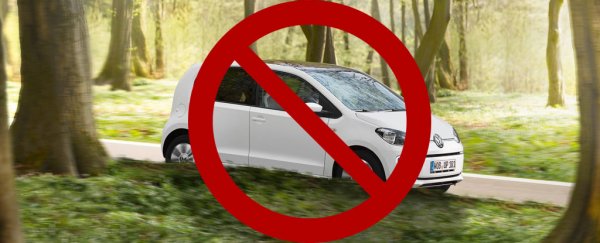In the past week, automobile maker Volkswagen has come under heavy fire after revelations that for several years it manufactured cars with special software designed specifically to cheat emissions tests in the US.
The company has admitted to and apologised for the deception – which could affect some 11 million cars around the world – and the former CEO has resigned in disgrace. But that's not the end of the story. Amid ongoing legal and regulatory actions that may take years to resolve, people want to know the ultimate environmental cost of Volkswagen's deceit, and scientists are beginning to calculate the damage.
While the company has issued a release claiming "[a]ll affected vehicles are safe and roadworthy from a technical standpoint", that's only partially true. They might be safe if you're behind the wheel, but not so much if you're outside of it.
The consequences of the illegal software, known as a 'defeat device', mean that the vehicle disables its emissions controls when driving normally (sending more harmful pollutants into the atmosphere) and only engages them (curbing pollutants) when it detects that it's being tested for emissions purposes.
While a thorough investigation of the emissions damage will have to wait until more is known about the true scale of the Volkswagen scandal, early estimates suggest that the company's deceit didn't just break the rules – it actually cost human lives too. At present, outdoor air pollution kills in excess of 3 million people every year, and automobile exhaust is a significant part of the problem.
According to an investigation by Margot Sanger-Katz and John Schwartz at The New York Times, the harmful nitrogen oxides emitted by Volkswagen's affected diesel vehicles – which the US Environmental Agency claims were 40 times higher than the legal level – could be responsible for as many as 106 deaths in the US between 2009 and 2015. That estimate is based on research concerning mortality rates related to US ozone reductions.
Noelle Eckley Selin, an associate professor of earth, atmospheric and planetary sciences at the Massachusetts Institute of Technology in the US, also ran a calculation on the Volkswagen death toll, this time basing her figures on EPA data related to human health impacts stemming from emissions. By this alternative method, she estimated the defeat device caused about 40 deaths in the US between 2009 and 2015.
While the reporters and researchers involved freely acknowledge that there's a considerable degree of looseness and approximation in these very preliminary calculations, it's not a bad place to start the scientific discussion on the human toll of Volkswagen's actions.
Especially when you consider that vehicles in the US are only a very small fraction of the company's overall worldwide market. From a global perspective, the actual death toll could be much higher.
